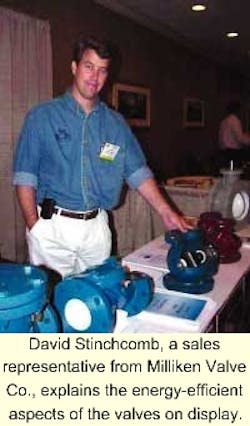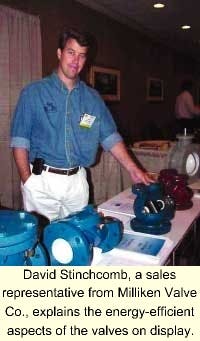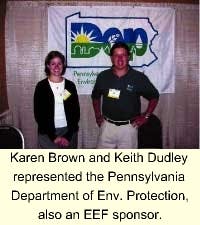Industry Responds to Energy Efficiency Conference
More than 30 speakers shared their experiences in trimming energy costs at municipal water and wastewater utilities. Topics included innovative pumping schemes, aeration system upgrades, and on-site power generation. Utility officials and consultants also discussed steps they used to take advantage of power industry deregulation.
As the event was held in Philadelphia, Benjamin Franklin was featured as the keynote speaker. Franklin, portrayed by Ralph Archbold, a motivational speaker, discussed the "challenge of change" and the need to work with others to attain goals.
The talk was well received by attendees, since most are involved in attempting to change the way their utilities do business. Many of the utilities represented at the forum are publicly owned and are examining energy upgrades as a way to avoid privatization and make their operations more business-like.
One of the first things a contract operations firm looks at when taking over operation of a water or wastewater system is energy consumption, according to Steve Bolles, Energy Services Manager for Woodard & Curran. Bolles presented a paper that focused on a contract operator's approach to reducing energy costs.
Energy conservation begins with making a list of all facility equipment and talking with plant operators about when and how the equipment is used, Bolles said. In a case study involving work at a 2 mgd trickling filter wastewater treatment facility, the operator was able to save $6,000 a year simply by adjusting the primary effluent pump recirculation rate. There was no up-front cost associated with the change. Another example involved improvements to temperature controls in the plant's buildings. While the project cost about $10,000, it saved more than $6,000 a year.
According to the Electric Power Research Institute (EPRI), an EEF sponsor, 1-2 percent of all electric power consumed in the United States is used by the water and wastewater industry. In general, most of the energy consumed by water utilities is for pumping raw or treated water. For wastewater systems, the usage is divided among pumping, aeration and sludge treatment.
Bruce Hartmann, a professional engineer and President of Hartmann Engineering, presented a paper on energy conservation measures and electrical load management changes that reduce energy costs. Most energy conservation opportunities fall into three basic categories: operational and management changes; equipment and hardware improvements; and process optimization or improvements, he said.
One operational change that does not require a huge investment is shifting energy loads to "off peak" times when electricity rates are lower. One advantage utilities have in a deregulated energy environment is the ability to shift around electrical loads, Hartmann said.
Powerware Solutions, which has been an active sponsor of EEF for the past three years, presented information on the state of the electric power deregulation. The company has developed a management system designed to help water utilities trim their energy consumption and costs. (See related article on page 26).
Next year's conference will be expanded and take on a new name, The WaterWorld 2001 Conference: Optimization and Energy Efficiency. It will be held in early December in Las Vegas. For more information on the event, contact Conference Coordinator Marvetta McNeel at 918-831-9500.
To participate on the conference planning committee, contact Kathy Pursley, at 918-831-9560 or send E-mail to [email protected]


